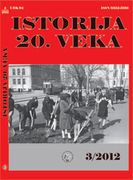Osvajanje neosvojivog: politička emancipacija žena u posleratnoj Jugoslaviji 1945-1953
Conquering The Unconquerable: Political Emancipation Of Women In Postwar Yugoslavia 1945-1953
Author(s): Ivana PantelićSubject(s): Gender Studies
Published by: Institut za savremenu istoriju, Beograd
Summary/Abstract: The period 1944-1948 was marked by rapid development of real-socialist regime. Women had a significant role in this process. Demobilized members of Partisan Army moved into cities in large numbers during the first post-war years. By a number of acts adopted in Yugoslavia and its newly-established republics, women became equal with men, following the model already applied in the USSR. Emancipation of women was, together with state, economic and social reforms, carried out with the help of the Party and the army. Women took part in elections for the first time in 1945. They were given the full - active and passive - suffrage. The propor-tion of women in the organs of new authorities was the same as in instituti-ons of the partisan state during the war. At the same time, there were no women in the federal government, while there was one woman minister in governments of the republics of Serbia, Croatia and Slovenia. Mitra Mitrovic was the Minister of Education in Serbia, Anka Berus the Minister of Fi-nance in Croatia and Vida Tomšic the Minister of Social Politics in Slove-nia. All three of the first women ministers were partisans and members of the Partisans during the war. The most important organization which, as part of the People’s Front, assembled women was the Women’s Antifascist Front of Yugoslavia. Women’s presence in the political institutions was absolutely symbolic and purely formal. In that authoritarian society they shared the same role as their male colleagues, their political goals were ide-ological but the institution called Women’s Antifascist Front of Yugoslavia symbolically enabled women to publicly advocate for their rights.
Journal: Istorija 20. veka
- Issue Year: 2012
- Issue No: 3
- Page Range: 139-154
- Page Count: 16
- Language: Serbian

